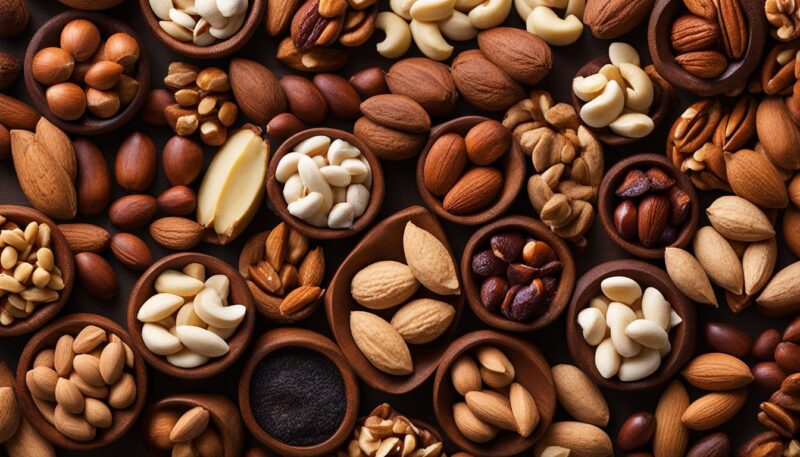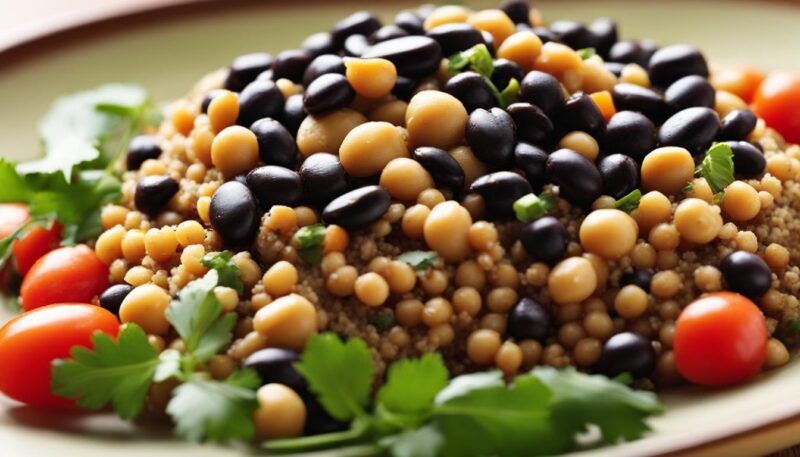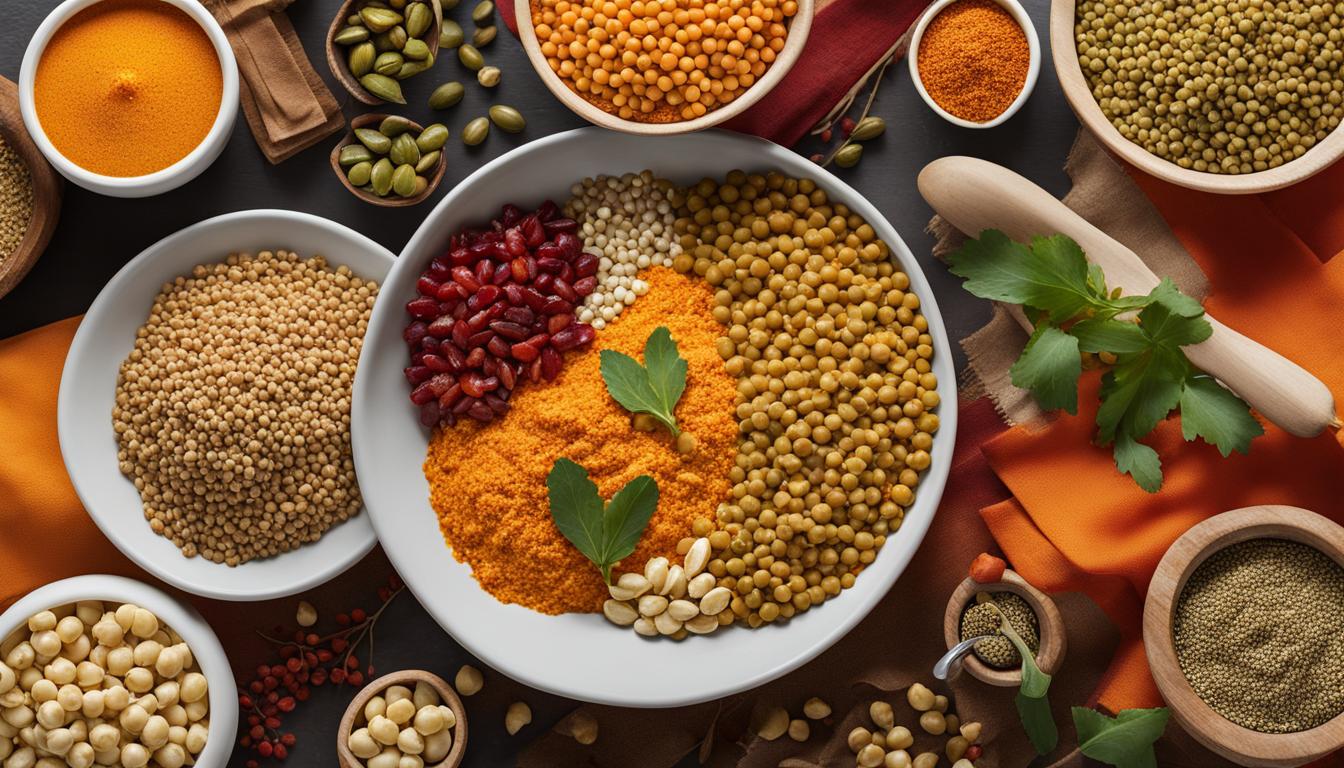Whole foods and real ingredients have become buzzwords in the health and wellness scene. But what do they really mean? Whole foods are unprocessed and full of nutrients, fiber, vitamins, and minerals. In terms of protein, there is an increasing emphasis on getting whole protein in one’s diet. Protein is essential for various bodily functions and can aid in healthy weight maintenance. However, not all proteins are created equal, and many animal products may not be the healthiest options due to added ingredients and processing. It’s important to consider plant-based protein sources, such as nuts, milk alternatives, legumes, and whole grains. These whole food proteins are versatile, delicious, and affordable additions to a healthy diet.
Key Takeaways:
- Whole foods are unprocessed and packed with nutrients, fiber, vitamins, and minerals.
- Protein is essential for bodily functions and maintaining a healthy weight.
- Choosing plant-based protein sources, such as nuts, milk alternatives, legumes, and whole grains, can offer health benefits.
- Plant-based milk alternatives can provide a protein boost and be used in various recipes.
- Legumes and quinoa are powerhouse plant-based proteins that offer versatility and exceptional health benefits.
The Power of Whole Food Proteins
Protein is a vital macronutrient that our bodies rely on for various functions. It is essential for the musculoskeletal system, hair, nails, and countless daily processes. Getting enough protein is important for maintaining a healthy weight, as it keeps us full and satisfied for longer. Whole food sources of protein, such as fruits, vegetables, whole grains, and minimally processed foods, offer a nutritious profile packed with fiber, vitamins, and minerals. These proteins are pure, single ingredients that provide the nutritional benefits nature intended. By prioritizing whole food proteins in your diet, you can enhance your health and support overall wellness.
The Benefits of Whole Food Proteins
Whole food proteins have numerous health benefits due to their nutritious profile. They are rich in essential amino acids, which are the building blocks of protein and necessary for optimal bodily functions. Additionally, whole food proteins provide a wide range of vitamins and minerals that support various systems in the body. For example, fruits and vegetables are not only good sources of protein but also provide antioxidants that can help protect against chronic diseases. Whole grains, on the other hand, are high in fiber, which aids digestion and promotes heart health. Incorporating whole food proteins into your diet can contribute to overall well-being and support a nutritious diet.
Comparing Whole Food Proteins to Processed Options
When it comes to protein sources, many processed options are available, such as protein bars and supplements. While these may seem convenient, they often contain added sugars, preservatives, and artificial ingredients. Whole food proteins, on the other hand, offer a natural and unprocessed alternative. They are free from unnecessary additives and provide a range of nutrients that are easily absorbed and utilized by the body. By choosing whole food proteins over processed options, you can fuel your body with wholesome nutrition and promote optimal health.
Conclusion
Incorporating whole food proteins into your diet is a simple and effective way to boost your health. These protein sources offer a nutritious profile packed with essential nutrients, fiber, and vitamins. By prioritizing whole, unprocessed foods, you can provide your body with the fuel it needs to thrive. So whether you opt for nuts, plant-based milk alternatives, legumes, or quinoa, make whole food proteins a staple in your diet and enjoy the health benefits they provide.
Nuts: The Perfect Protein-Rich Snack
When it comes to protein-rich whole foods, nuts are the perfect choice. Packed with protein, healthy fats, fiber, and essential nutrients, they offer a well-rounded nutritional profile. Some of the most protein-rich nuts include peanuts, almonds, and pistachios, which provide around 6-7 grams of protein per ounce. Not only are nuts a convenient and portable snack, but they are also incredibly versatile in the kitchen, making them a fantastic addition to a healthy diet.
Whether you enjoy them on their own or incorporate them into your favorite dishes, nuts can add a satisfying crunch and a boost of nutrition. They can be sprinkled on top of salads, blended into smoothies, or mixed into homemade protein bars for an extra protein punch. However, it’s crucial to choose raw or roasted nuts without added oils or excess salt to maximize their health benefits.
For those who prefer a smoother texture, nut butters are an excellent alternative. Just make sure to select options that contain only nuts and perhaps a little salt, without any added sugars or oils. By incorporating nuts into your diet, you can enjoy a protein-rich snack that not only satisfies your cravings but also provides essential nutrients for optimal health.
“Nuts are a fantastic source of protein, healthy fats, and fiber, making them an excellent snack option for those looking to boost their protein intake. They are versatile, easily portable, and provide a delicious and convenient way to fuel your body with essential nutrients.” – Nutritionist Sarah Thompson
Table: Comparison of Protein Content in Different Types of Nuts
| Nut Type | Protein Content per 1 ounce (28g) |
|---|---|
| Almonds | 6g |
| Peanuts | 7g |
| Pistachios | 6g |
In conclusion, nuts are an excellent choice for a protein-rich snack. They are versatile, portable, and offer a wide range of health benefits. Whether you prefer almonds, peanuts, or pistachios, incorporating nuts into your diet can provide you with a delicious and nutritious way to support your overall health and well-being.

Plant-Based Milk Alternatives: A Protein Boost
Plant-based milk alternatives have gained popularity in recent years as more people adopt a plant-based lifestyle or seek alternatives to dairy milk. These milk alternatives offer a variety of options for those looking to increase their protein intake while avoiding animal products. With advancements in food technology, many plant-based milks are now protein-enriched, making them an excellent choice for those seeking a protein boost.
One example of a protein-enriched plant-based milk alternative is pea protein milk. Pea protein is a high-quality protein source derived from yellow split peas. It is rich in essential amino acids and provides up to 10 grams of protein per glass. Pea protein milk can be enjoyed on its own, added to smoothies, or used in recipes that call for milk.
Another protein-rich option is cashew milk. Cashews are not only creamy and delicious but also a good source of plant-based protein. Cashew milk typically contains around 5 grams of protein per cup. It can be used in coffee, cereal, or recipes that require milk, providing a protein-rich alternative to dairy milk.
Organic soy milk is another plant-based milk alternative that offers a significant amount of protein. Soy milk contains all essential amino acids, making it a complete protein source. A glass of organic soy milk can provide up to 8 grams of protein. It can be enjoyed on its own, used in cooking and baking, or added to smoothies for a protein boost.
Comparative Nutritional Profile of Plant-Based Milk Alternatives
| Milk Alternative | Protein per Glass (Approx.) | Calories per Glass (Approx.) | Calcium per Glass (Approx.) | Fat per Glass (Approx.) |
|---|---|---|---|---|
| Pea Protein Milk | 10 grams | 80 calories | 200 mg | 4 grams |
| Cashew Milk | 5 grams | 25 calories | 45 mg | 2 grams |
| Organic Soy Milk | 8 grams | 90 calories | 300 mg | 4 grams |
By incorporating plant-based milk alternatives into your diet, you can enjoy a protein-enriched beverage that is versatile, nutritious, and suitable for a variety of dietary preferences and restrictions.
When choosing plant-based milk alternatives, it is important to read labels and select options that are protein-enriched and made from quality ingredients. Look for unsweetened varieties to avoid added sugars. Incorporating these protein-rich milk alternatives into your diet can provide a valuable protein boost and contribute to a nutritious and balanced eating plan.
Legumes and Quinoa: Powerhouse Proteins
Legumes and quinoa are excellent plant-based protein sources that offer a wide range of health benefits. These versatile ingredients are not only packed with protein but also provide essential nutrients, fiber, and vitamins. Incorporating legumes and quinoa into your diet can add variety, flavor, and exceptional nutritional value to your meals.
The Power of Legumes
Legumes, such as lentils, chickpeas, and black beans, are rich in protein, making them an excellent choice for vegetarians and those looking to diversify their protein sources. One cup of cooked lentils provides a whopping 18 grams of protein, making it a fantastic addition to soups, salads, and curries. Chickpeas, often used to make hummus, offer about 15 grams of protein per cup. Black beans are another legume powerhouse, with approximately 15 grams of protein per cup. These legumes are not only a great source of protein but also high in fiber, which aids in digestion and helps keep you feeling full and satisfied.
The Versatility of Quinoa
Quinoa, often referred to as a superfood, is a complete plant-based protein, meaning it contains all nine essential amino acids. With 8 grams of protein per cup, quinoa is a versatile and nutritious grain that can be used in a variety of dishes. It can be cooked and enjoyed as a side dish, added to salads, or used as a base for stir-fries. Quinoa can also be ground into flour and used in baking recipes. Incorporating quinoa into your diet not only provides a protein boost but also adds a nutty flavor and hearty texture to your meals.
The Benefits of Plant-Based Protein
Choosing legumes and quinoa as plant-based protein sources offers numerous benefits for your health. These foods are naturally low in saturated fat, cholesterol-free, and rich in fiber, which can aid in digestion and promote a healthy heart. Additionally, plant-based protein sources are environmentally friendly, requiring fewer resources to produce compared to animal-based proteins. By incorporating legumes and quinoa into your diet, you can enjoy the health benefits of protein while supporting sustainable food choices.

Conclusion
Incorporating whole food proteins into your diet is a simple and effective way to boost your health and achieve a nutritious diet. These protein-rich foods, such as nuts, plant-based milk alternatives, legumes, and quinoa, provide a wide range of essential nutrients that support overall well-being.
Choosing whole food proteins ensures that you are fueling your body with natural and unprocessed sources of protein. These foods are rich in fiber, vitamins, and minerals, which are necessary for optimal health. By prioritizing whole food proteins, you can maintain a healthy weight and support the functioning of your musculoskeletal system, hair, nails, and other vital processes.
Building a diet rich in whole food proteins not only provides the necessary nutrients but also offers a variety of delicious options. Whether you enjoy a handful of nuts as a snack or incorporate legumes and quinoa into your meals, these proteins are versatile and affordable. By focusing on whole food proteins, you can create a solid foundation for a nutritious diet that boosts your health and well-being.
FAQ
What are whole foods?
Whole foods are unprocessed and full of nutrients, fiber, vitamins, and minerals.
Why is protein important for our bodies?
Protein is essential for various bodily functions, including the musculoskeletal system, hair, nails, and daily processes. It aids in healthy weight maintenance and keeps us full and satisfied for longer.
What are some whole food protein sources?
Some whole food protein sources include fruits, vegetables, whole grains, and minimally processed foods.
How much protein do nuts provide?
Nuts, such as peanuts, almonds, and pistachios, offer around 6-7 grams of protein per ounce.
Can plant-based milk alternatives be a good source of protein?
Yes, plant-based milk alternatives like pea protein milk, cashew milk, and soy milk can provide up to 10 grams of protein per glass.
What are some examples of plant-based protein-rich legumes?
Some examples of plant-based protein-rich legumes are lentils, chickpeas, and black beans.
Can quinoa be a good source of plant-based protein?
Yes, quinoa is an excellent plant-based protein source with 8 grams of protein per cup.
How can I add raw protein whole foods to my diet?
You can add raw protein whole foods to your diet by incorporating nuts, plant-based milk alternatives, legumes, and quinoa into your meals and snacks.
How can prioritizing whole food proteins benefit my health?
Prioritizing whole food proteins can provide your body with the necessary nutrients, support healthy weight management, and contribute to overall health.

